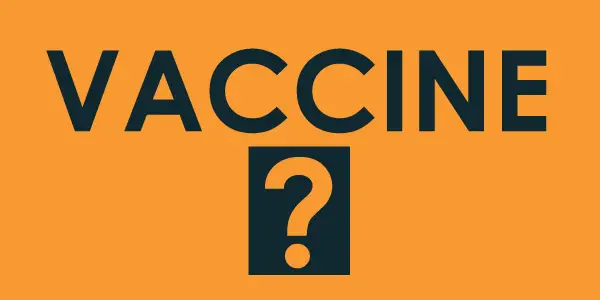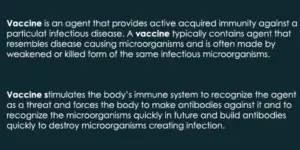
What is Vaccine?
In this section, You’ll learn about What is vaccine. It is a processed medicine with dead or living microbes that have been weakened and has a role in causing certain diseases, are injected into the body to gain immunity against the infectious disease. The vaccination is a very clever approach by scientists.

The vaccination is one of the best preventive ways we can take to protect an infant, child, or teenager from infectious diseases that are contagious.
How does vaccine work
How does vaccine work: Vaccination do strengthen the immune system against future infections with certain diseases. There are vaccines against each of the pathogens, whether these pathogens are viral, bacterial, or other causative agents of the disease.
Vaccines are considered highly effective but not 100% effective, due to the difference in the immune system of the vaccinated people as the immune system does not generate an adequate response and therefore, it will not be effectively protected after vaccination, however, the effectiveness of most vaccines remains high.
The most important vaccinations that have been produced
There are many vaccinations that have been produced and are most important in today’s date, but there are types that outweigh other types in terms of importance, the following are the vaccinations
- Hepatitis B vaccination: protects against hepatitis B infection transmitted through the blood.
- DTap vaccination: protects against diphtheria, tetanus, and pertussis.
- Hip vaccination: protects against Haemophilus influenza type B bacteria that causes pneumonia, meningitis, and epiglottitis.
- PCV13 vaccination: protects against pneumococcal disease.
- Poliovirus vaccination: (Inactivated poliovirus vaccine) protects against polio, which causes permanent paralysis.
- Rotavirus vaccination: Protects against rotavirus, which is the most common cause of childhood diarrhea.
- MMR vaccination: It protects against rubella, rubella, and mumps, basil that measles and mumps are green diseases that lead to brain damage, and rubella leads to severe birth defects when infected during pregnancy.
- Varicella vaccination: It protects against chickenpox, which in spite of it is benign in most people, but it can lead to hospitalization, especially among young children.
- Hepatitis A vaccination: protects against acute liver disease (i.e. short-term).
- Influenza vaccination: This type of vaccine is given annually and protects against seasonal influenza.
- Tdap vaccination: immunize against tetanus, diphtheria, and pertussis (whooping cough).
- Meningococcal vaccination: protects against meningococcal diseases that cause meningitis and blood infection.
Human papillomavirus vaccinations
- Pneumococcal vaccination “PPSV23”: protects against pneumonia and is usually given in the elderly.
- Yellow fever vaccination: It protects against yellow fever, which is a tropical disease, and is given to people traveling to some tropical countries.
- Shingles vaccination: reduces the risk of elderly shingles and is a very painful rash.
- Cholera vaccination:: given to travelers to the tropics and cholera causes fatal watery diarrhea.
- Japanese encephalitis vaccination: Although most people with Japanese encephalitis have no symptoms, Japanese encephalitis can cause encephalitis, it is recommended that the vaccine be given to travelers in rural Asia.
- Typhoid vaccination: Protects against typhoid, typhoid causes fever, stomach pain, and severe weakness, so travelers to remote countries should take it.
- Rabies vaccination: Rabies kills the majority of people who do not receive immediate vaccination after being exposed to a dog bite, as people who have been bitten by wild animals should be treated by the vaccine as soon as possible.
The vaccinations child takes in his early years
The schedule of vaccinations varies from country to country according to the health system followed, but some vaccinations are shared as follows:
- At birth: In the first hours of the birth of the child, a vaccine against hepatitis B (HBV) is given, in addition to a BCG vaccination that protects against pulmonary tuberculosis.
- Month-by-month: The child at the age of the month is given a hepatitis B vaccination by ″2 and a non-live polio vaccine, “IPV1”.
- At the age of two months: The child takes five vaccinations, which are:
- Non-live polio vaccine (2).
- Polio points.
- The quintet vaccine consists of (diphtheria, tetanus, pertussis vaccine, and a vaccine against Haemophilus influenza type B bacteria and hepatitis B vaccine with “3” ”).
- Rota vaccine.
- PCV1 vaccine.
- At the age of 4 months: The child takes the same vaccines but without the non-live polio vaccine, that is, he takes (polio points 2, pentavalent vaccine 2, pneumococcal vaccine 2, and Rota vaccine 2).
- At the age of 6 months: The child takes the 5-year vaccinations and 3 polio points.